Supreme Court Term 2024-2025
WeÔÇÖre breaking down the cases we've asked the court to consider this term.
Latest Case Updates
Ongoing
Updated June 13, 2025
Closed (Judgment)
Updated June 6, 2025
Ongoing
Updated May 8, 2025
Ongoing
Updated March 24, 2025
Featured
Georgia Supreme Court
Jun 2025

Voting Rights
Eternal Vigilance Action, Inc. v. Georgia
The ╠ăđ─Vlogand partner organizations intervened in this case to represent the rights of voters and voting-rights organizations in a case challenging a number of rules passed by the Georgia State Election Board. We challenged the rule requiring that the number of votes cast be hand counted at the polling place prior to the tabulation of votes. In a critical victory for Georgia voters, in June 2025, the Georgia Supreme Court upheld a lower courtÔÇÖs decision permanently blocking the rule requiring hand counting of ballots at polling places before tabulation ÔÇö a process widely criticized for risking delays, ballot spoliation, and voter disenfranchisement.
U.S. Supreme Court
May 2025

Voting Rights
Racial Justice
Allen v. Milligan
Whether AlabamaÔÇÖs congressional districts violate Section 2 of the Voting Rights Act because they discriminate against Black voters. We succeeded in winning a new map for 2024 elections which, for the first time, has two congressional district that provide Black voters a fair opportunity to elect candidates of their choosing despite multiple attempts by Alabama to stop us at the Supreme Court. Despite this win, Alabama is still defending its discriminatory map, and a trial was held in February 2025 to determine the map for the rest of the decade.
In May 2025, a federal court ruled that Alabama's 2023 congressional map both violates Section 2 of the Voting Rights Act and was enacted by the Alabama Legislature with racially discriminatory intent.
Washington, D.C.
Apr 2025

Voting Rights
League of Women Voters Education Fund v. Trump
On March 25, 2025, in a sweeping and unprecedented Executive Order, President Trump attempted to usurp the power to regulate federal elections from Congress and the States. Among other things, the Executive Order directs the Election Assistance CommissionÔÇöan agency that Congress specifically established to be bipartisan and independentÔÇöto require voters to show a passport or other citizenship documentation in order to register to vote in federal elections. If implemented, the Executive Order would threaten the ability of millions of eligible Americans to register and vote and upend the administration of federal elections.
On behalf of leading voter registration organizations and advocacy organizations, the ╠ăđ─Vlogand co-counsel filed a lawsuit to block the Executive Order as an unconstitutional power grab.
Maryland
Apr 2025

Religious Liberty
LGBTQ Rights
Mahmoud v. Taylor
On April 9, 2025, the ╠ăđ─Vlogand ╠ăđ─Vlogof Maryland filed an amicus brief with the U.S. Supreme Court supporting the Montgomery County Public Schools (MCPS) in its efforts to ensure that its English Language Arts curriculum is LGBTQ-inclusive.
U.S. Supreme Court
Mar 2025

Voting Rights
Callais v. Landry
Whether the congressional map Louisiana adopted to cure a Voting Rights Act violation in Robinson v. Ardoin is itself unlawful as a gerrymander.
New Hampshire
Mar 2025
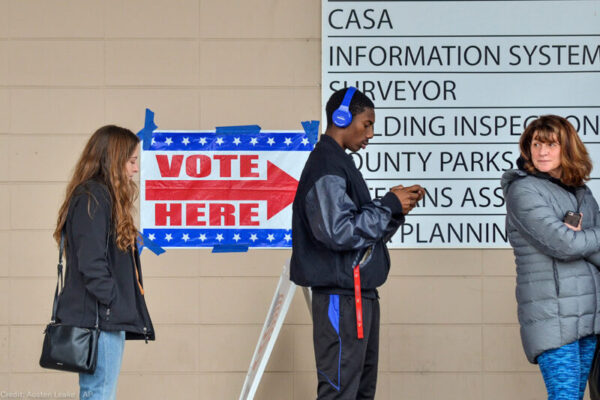
Voting Rights
Coalition for Open Democracy v. Scanlan
This lawsuit challenges HB 1569, a new law that will make New Hampshire the only state to require every person to produce documentary proof of citizenship when they register to vote for both state and federal elections. It also challenges HB 1569ÔÇÖs elimination a preexisting protection for votersÔÇönamely, an affidavit option that allowed voters who faced surprise challenges to their eligibility at the polls to swear to their qualifications and cast a ballot. Accordingly, HB 1569 violates the First and Fourteenth Amendments of the U.S. Constitution by placing substantial burdens on New Hampshirites at all stages of the voting process, and will arbitrarily disenfranchise hundreds, if not thousands of qualified voters.
South Carolina Supreme Court
Jan 2025
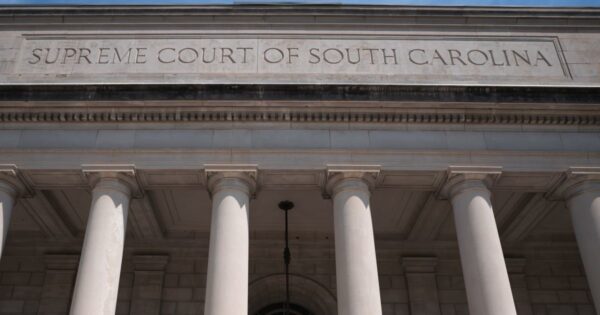
Voting Rights
League of Women Voters of South Carolina v. Alexander
This case involves a state constitutional challenge to South CarolinaÔÇÖs 2022 congressional redistricting plan, which legislators admit was drawn to entrench a 6-1 Republican majority in the stateÔÇÖs federal delegation. Plaintiff the League of Women Voters of South Carolina has asked the stateÔÇÖs Supreme Court to conclude that the congressional map is an unlawful partisan gerrymander that violates the state constitution.
Texas
Oct 2024
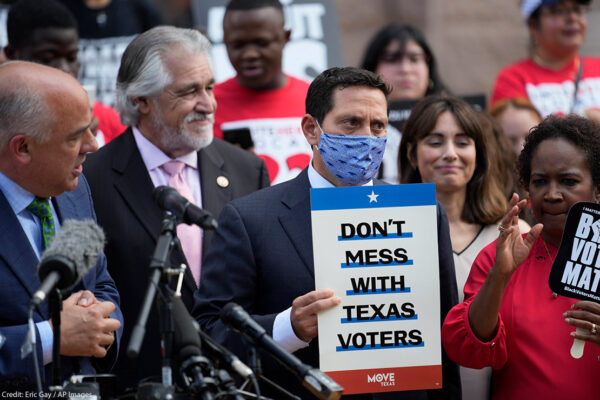
Voting Rights
OCA-Greater Houston v. Paxton
Texas has growing Hispanic and Black populations that helped propel record voter turnout in the November 2020 election. The Texas Legislature responded to this increased civic participation with an omnibus election bill titled Senate Bill 1ÔÇöSB 1 for shortÔÇöthat targeted election practices that made voting more accessible to traditionally marginalized voters like voters of color, voters with disabilities, and voters with limited English proficiency. Since 2021, SB 1 has resulted in tens of thousands of lawful votes being rejected, and it remains a threat to democracy in Texas.
Ohio
Sep 2024

Reproductive Freedom
Planned Parenthood Southwest Ohio Region et al., v. Ohio Department of Health, et al.
The ╠ăđ─Vlog, the ╠ăđ─Vlogof Ohio, Planned Parenthood Federation of America, the law firm WilmerHale, and Fanon Rucker of the Cochran Law Firm, on behalf of Planned Parenthood Southwest Ohio Region, Planned Parenthood of Greater Ohio, Preterm-Cleveland, WomenÔÇÖs Med Group Professional Corporation, Dr. Sharon Liner, and Julia Quinn, MSN, BSN, amended a complaint in an existing lawsuit against a ban on telehealth medication abortion services to bring new claims under the Ohio Reproductive Freedom Amendment, including additional challenges to other laws in Ohio that restrict access to medication abortion in the state.
All Cases
1,584 Court Cases
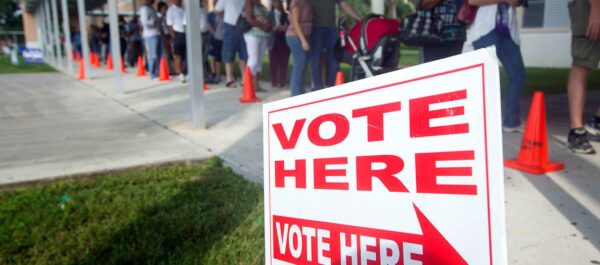
Florida
Dec 2023
Voting Rights
Supporting Defendants in Unlawful Florida Prosecutions of Returning Citizens (Amicus)
Florida has arrested and prosecuted many returning citizensÔÇöpersons with felony convictions who are no longer incarceratedÔÇöfor registering and voting while ineligible. These prosecutions have occurred amid widespread confusion about voting rights restoration in Florida and have been initiated by an Office of Statewide Prosecutor (ÔÇťOSPÔÇŁ) that has no authority to bring these criminal actions.
Explore case
Florida
Dec 2023

Voting Rights
Supporting Defendants in Unlawful Florida Prosecutions of Returning Citizens (Amicus)
Florida has arrested and prosecuted many returning citizensÔÇöpersons with felony convictions who are no longer incarceratedÔÇöfor registering and voting while ineligible. These prosecutions have occurred amid widespread confusion about voting rights restoration in Florida and have been initiated by an Office of Statewide Prosecutor (ÔÇťOSPÔÇŁ) that has no authority to bring these criminal actions.

Kentucky
Dec 2023
Reproductive Freedom
Jane Doe, et al. v. Daniel Cameron, et al.
A Kentucky woman filed a lawsuit in Jefferson County Circuit Court challenging two of the CommonwealthÔÇÖs abortion bans that collectively eliminate almost all access to abortion in the Commonwealth. The case details the severe harms that Jane Doe, who is approximately eight weeks pregnant, and a class of all pregnant Kentuckians seeking abortion are enduring because the government has denied her access to the care she needs.
Explore case
Kentucky
Dec 2023

Reproductive Freedom
Jane Doe, et al. v. Daniel Cameron, et al.
A Kentucky woman filed a lawsuit in Jefferson County Circuit Court challenging two of the CommonwealthÔÇÖs abortion bans that collectively eliminate almost all access to abortion in the Commonwealth. The case details the severe harms that Jane Doe, who is approximately eight weeks pregnant, and a class of all pregnant Kentuckians seeking abortion are enduring because the government has denied her access to the care she needs.

Minnesota Supreme Court
Dec 2023
Criminal Law Reform
State v Malecha
In this case, the Minnesota Supreme Court is considering the scope of a crucial doctrine that protects criminal defendants from being convicted based on evidence obtained in violation of their constitutional rights. Under both the U.S. and Minnesota Constitutions, courts apply an ÔÇťexclusionary ruleÔÇŁ that allows criminal defendants to seek the exclusion of evidence obtained in violation of their rights. For nearly 40 years, the U.S. Supreme Court has chipped away at the exclusionary rule by adopting and expanding the ÔÇťgood faith exception,ÔÇŁ a doctrine providing that in some situations courts need not exclude evidence obtained in violation of the Constitution. In this case, officers acquired evidence after arresting someone based on a warrant that was listed as valid due to a recordkeeping error, but which in fact should have been recalled. In July 2023, together with other ╠ăđ─Vlogattorneys and partners, the SSCI submitted an amicus brief to the Minnesota Supreme Court asking it to hold as a matter of state constitutional law that the exclusionary rule applies to this situation, and that the good-faith exception does not apply. In March 2024, the Court ruled in the ACLU's favor, stating that the district court did not err in finding that the defendant's arrest warrant had been quashed before her arrest and the good-faith exception did not apply.
Explore case
Minnesota Supreme Court
Dec 2023

Criminal Law Reform
State v Malecha
In this case, the Minnesota Supreme Court is considering the scope of a crucial doctrine that protects criminal defendants from being convicted based on evidence obtained in violation of their constitutional rights. Under both the U.S. and Minnesota Constitutions, courts apply an ÔÇťexclusionary ruleÔÇŁ that allows criminal defendants to seek the exclusion of evidence obtained in violation of their rights. For nearly 40 years, the U.S. Supreme Court has chipped away at the exclusionary rule by adopting and expanding the ÔÇťgood faith exception,ÔÇŁ a doctrine providing that in some situations courts need not exclude evidence obtained in violation of the Constitution. In this case, officers acquired evidence after arresting someone based on a warrant that was listed as valid due to a recordkeeping error, but which in fact should have been recalled. In July 2023, together with other ╠ăđ─Vlogattorneys and partners, the SSCI submitted an amicus brief to the Minnesota Supreme Court asking it to hold as a matter of state constitutional law that the exclusionary rule applies to this situation, and that the good-faith exception does not apply. In March 2024, the Court ruled in the ACLU's favor, stating that the district court did not err in finding that the defendant's arrest warrant had been quashed before her arrest and the good-faith exception did not apply.

Massachusetts Supreme Court
Dec 2023
Capital Punishment
Graham v. Hampden County District Attorney
Federal and state constitutional law requires prosecutors to inquire into and disclose misconduct by members of their prosecution teams. In Massachusetts, the Supreme Judicial Court has applied those principles, and others, in cases that have led to the mass exoneration of people convicted of drug crimes with the assistance of former state chemists who committed misconduct. In Graham, the ╠ăđ─Vlogand public defenders are asking the Massachusetts Supreme Judicial Court to apply those same principles to a situation where the U.S. Department of Justice has alleged a pattern or practice of misconduct by members of a police departmentÔÇöspecifically, the Narcotics Bureau of the Springfield (MA) Police Department. The Springfield investigation was the DOJÔÇÖs sole pattern-or-practice investigation during the Trump Administration, but the DOJ has opened several such investigations during the Biden Administration. Graham appears to be the first state supreme court case in the country to consider whether DOJ pattern-or-practice findings can trigger duties under state law to investigate and disclose the misconduct alleged by the DOJ. In a major victory, the Massachusetts Supreme Judicial Court ruled in January 2024 that the Hampden County District AttorneyÔÇÖs Office violated its duties to disclose and inquire about exculpatory evidence of widespread misconduct by Springfield police.
Explore case
Massachusetts Supreme Court
Dec 2023

Capital Punishment
Graham v. Hampden County District Attorney
Federal and state constitutional law requires prosecutors to inquire into and disclose misconduct by members of their prosecution teams. In Massachusetts, the Supreme Judicial Court has applied those principles, and others, in cases that have led to the mass exoneration of people convicted of drug crimes with the assistance of former state chemists who committed misconduct. In Graham, the ╠ăđ─Vlogand public defenders are asking the Massachusetts Supreme Judicial Court to apply those same principles to a situation where the U.S. Department of Justice has alleged a pattern or practice of misconduct by members of a police departmentÔÇöspecifically, the Narcotics Bureau of the Springfield (MA) Police Department. The Springfield investigation was the DOJÔÇÖs sole pattern-or-practice investigation during the Trump Administration, but the DOJ has opened several such investigations during the Biden Administration. Graham appears to be the first state supreme court case in the country to consider whether DOJ pattern-or-practice findings can trigger duties under state law to investigate and disclose the misconduct alleged by the DOJ. In a major victory, the Massachusetts Supreme Judicial Court ruled in January 2024 that the Hampden County District AttorneyÔÇÖs Office violated its duties to disclose and inquire about exculpatory evidence of widespread misconduct by Springfield police.
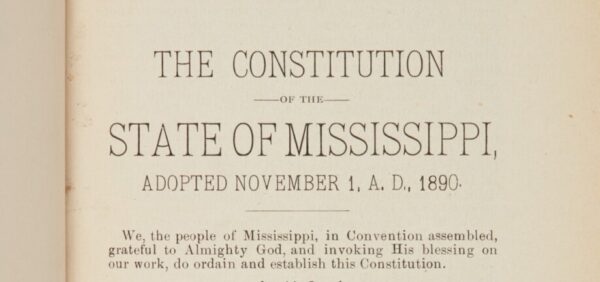
Mississippi
Dec 2023
Voting Rights
Hopkins v. Watson (Amicus)
Mississippi is home to one of the strictest felon disenfranchisement schemes in the nation. The Mississippi Constitution permanently disenfranchises citizens upon a single felony conviction for certain crimes, including minor offenses like writing a bad check. As a result, the loss of rights under MississippiÔÇÖs scheme is mandatory, permanent, and effectively irrevocable. In Hopkins, plaintiffs, a class of formerly incarcerated individuals who lost their right to vote despite completing their sentences, argued that their disenfranchisement violated the Eighth AmendmentÔÇÖs prohibition on cruel and unusual punishment. A three-judge panel of the U.S. Court of Appeals for the Fifth Circuit ruled in the plaintiffsÔÇÖ favor and struck down MississippiÔÇÖs disenfranchisement scheme as cruel and unusual punishment. But the Fifth Circuit decided to rehear the case en banc, a rare occurrence in which a case is reconsidered by the entire panel of the circuitÔÇÖs active judges.
Explore case
Mississippi
Dec 2023

Voting Rights
Hopkins v. Watson (Amicus)
Mississippi is home to one of the strictest felon disenfranchisement schemes in the nation. The Mississippi Constitution permanently disenfranchises citizens upon a single felony conviction for certain crimes, including minor offenses like writing a bad check. As a result, the loss of rights under MississippiÔÇÖs scheme is mandatory, permanent, and effectively irrevocable. In Hopkins, plaintiffs, a class of formerly incarcerated individuals who lost their right to vote despite completing their sentences, argued that their disenfranchisement violated the Eighth AmendmentÔÇÖs prohibition on cruel and unusual punishment. A three-judge panel of the U.S. Court of Appeals for the Fifth Circuit ruled in the plaintiffsÔÇÖ favor and struck down MississippiÔÇÖs disenfranchisement scheme as cruel and unusual punishment. But the Fifth Circuit decided to rehear the case en banc, a rare occurrence in which a case is reconsidered by the entire panel of the circuitÔÇÖs active judges.
